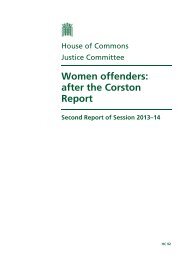Minority voices: Research into the access and acceptability of ... - MMC
Minority voices: Research into the access and acceptability of ... - MMC
Minority voices: Research into the access and acceptability of ... - MMC
- No tags were found...
Create successful ePaper yourself
Turn your PDF publications into a flip-book with our unique Google optimized e-Paper software.
factors that study participants identified as helpful in service provision <strong>and</strong> in facilitating <strong>access</strong>to mental health support <strong>and</strong> engagement with staff.A complementary report, <strong>Minority</strong> Voices: A guide to good practice in planning <strong>and</strong> providingservices for <strong>the</strong> mental health <strong>of</strong> young people from Black <strong>and</strong> minority ethnic communities 6 isbased on <strong>the</strong> findings <strong>of</strong> this study.Key findingsFrom <strong>the</strong> mapping <strong>of</strong> services: a very mixed picture <strong>of</strong> activity emerges, suggesting thatsome parts <strong>of</strong> <strong>the</strong> country are quite active in developing services for young people from Black<strong>and</strong> minority ethnic groups - <strong>and</strong> <strong>of</strong> forging links with community services - whereas o<strong>the</strong>rshave little or no specific provision.From <strong>the</strong> in-depth study <strong>of</strong> four sample areas: a wide range <strong>of</strong> concerns about existingmental health service provision <strong>and</strong> problems in <strong>access</strong>ing services was reported by bothyoung people <strong>and</strong> staff alike. It is salient to note that many <strong>of</strong> <strong>the</strong>se concerns, difficulties <strong>and</strong>areas <strong>of</strong> unmet need echo those documented in <strong>the</strong> literature. This suggests that althoughclearly in some parts <strong>of</strong> <strong>the</strong> country progress is being made, <strong>the</strong> impact <strong>of</strong> <strong>the</strong> significantinvestment in CAMHS in recent years has yet to be felt amongst many young people fromBlack <strong>and</strong> minority ethnic communities. More positively <strong>the</strong> fieldwork also revealed examples<strong>of</strong> innovative practice that were proving effective in promoting service <strong>access</strong> for young people<strong>and</strong> plenty <strong>of</strong> ideas <strong>and</strong> suggestions for how services should be developed in <strong>the</strong> future.Key issuesThe issues emerging from <strong>the</strong> <strong>Minority</strong> Voices study can, to some extent, be presented in twocategories:• How to reach <strong>and</strong> engage with young people from Black <strong>and</strong> minority ethnic groups whomay require help from mental health services.• What needs to happen to aid <strong>the</strong> development <strong>of</strong> effective service provision for youngpeople from Black <strong>and</strong> minority ethnic groups.! Reaching young peopleThroughout <strong>the</strong> study, a recurrent problem was actually making contact with young peoplefrom Black <strong>and</strong> minority ethnic groups. This was ei<strong>the</strong>r because only a few were presenting toservices (noted by a considerable number <strong>of</strong> CAMHS staff), or because <strong>of</strong> a fear, expressed bymany young people, <strong>of</strong> talking about <strong>the</strong>ir experiences. Concerns about confidentiality, havinginsufficient time to get to know <strong>and</strong> to trust staff <strong>and</strong> <strong>the</strong> stigma <strong>of</strong> accepting help from mentalhealth services were <strong>the</strong> reasons <strong>of</strong>ten given. For some CAMH services struggling with highnumbers <strong>of</strong> referrals, only limited time could be given in helping <strong>the</strong> research team to makecontact with young people which also affected <strong>the</strong> number who were eventually recruited to<strong>the</strong> study.Ano<strong>the</strong>r difficulty encountered was that <strong>of</strong> voluntary sector projects working with young peopleclosing down, <strong>of</strong>ten due to funding instability. On a number <strong>of</strong> occasions <strong>the</strong> research teamidentified <strong>and</strong> made contact with services that appeared to be supporting young people fromminority ethnic groups only to find that ei<strong>the</strong>r <strong>the</strong> service had already closed or was trying t<strong>of</strong>ind alternatives for its clients since it was facing this threat. As one might expect in suchcircumstances, maintaining contact with some young people was extremely difficult to achieve.From <strong>the</strong> interviews undertaken, it was apparent that many young people had very limitedawareness or underst<strong>and</strong>ing <strong>of</strong> CAMHS <strong>and</strong> thus, how <strong>the</strong>y might <strong>access</strong> <strong>the</strong>se services. Theirunderst<strong>and</strong>ing <strong>of</strong> what is meant by ‘mental health’ was poor, with many talking <strong>of</strong> mentalhealth in terms <strong>of</strong> madness, or very serious illness, <strong>and</strong> as such, something that <strong>the</strong>y did notsee as applicable to <strong>the</strong>m. Some also expressed a mistrust <strong>of</strong> services <strong>and</strong> pr<strong>of</strong>essionals<strong>and</strong>/or fear <strong>of</strong> being labelled ‘mad’ as a result <strong>of</strong> <strong>access</strong>ing support. These difficulties<strong>Minority</strong> Voices <strong>Research</strong> Report4
















